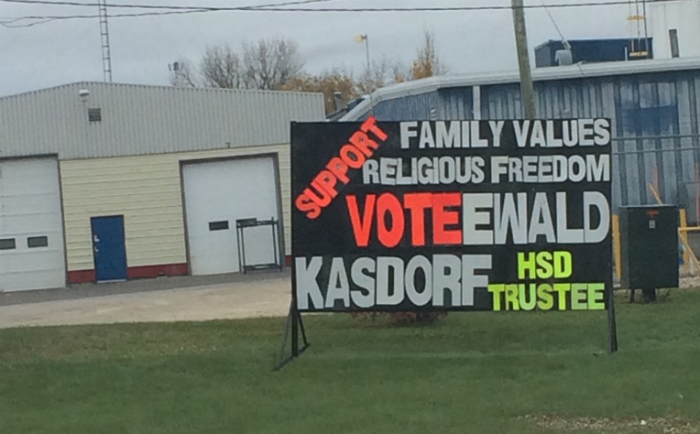On October 22 residents throughout Manitoba will head to the polls to elect municipal leaders for another four-year term. In big cities and small towns, voters will be asked to select a mayor or reeve, councillors, and a slew of school trustees. Unfortunately, one of these things is not like the others.
Perhaps it was due to the predictability and stability of the municipal election cycle, or because of the supposed attention to local issues typical of that level of government. Either way, including school board elections on municipal ballots is misguided, and in need of serious reconsideration.
***
Turnout in the 2010 Winnipeg municipal election was 47.1%. In 2006, 38.2%. These numbers merely tell the tale of the percentage of eligible voters in Winnipeg who bothered to cast their ballots; it fails to break down the percentage of those who voted for everything on them. Specifically, it neglects to paint the grimmer picture of the percentage of voters who simply skipped the final section of their municipal ballot, which deals with school boards. Indeed, while 47.1% of Winnipeggers voted in 2010, fewer bothered to vote for their councillor, and even fewer still bothered to vote for their school trustees.
This is a problem.
As is made plain in Manitoba’s Public Schools Act, school boards are entrusted with various and many powers. Boards’ trustees are responsible for drafting and implementing policies surrounding Internet and cell-phone usage, school food and nutrition, and respecting diversity. They’re responsible for ensuring children within their wards actually attend school, and have the resources they need to succeed when there. Above all, and perhaps most important to “tax payers,” they set and approve school budgets. These are by no means small tasks. So much so, voters in Winnipeg for example are required to select upwards of 2 or even 3 trustees on their ballots so as to ensure each board has between 5 and 9 trustees in total.
One would think with so much at stake and so many issues in play turnout would be highest for trustees! School boards, after all, are providing important oversight and management of our public education system; one of the most important building blocks of modern society.
Okay, perhaps highest is a stretch, but surely turnout ought to be higher than it has been historically. And it can be—if we divest ourselves of this antiquated notion school board elections should be held concurrent to municipal elections; on the contrary, they ought to take place at the same time as our provincial elections when the issue of public education isn’t just more present in the minds of voters, but within the jurisdiction of that level of government for which voters are being asked to vote.
During the current mayoral election in Winnipeg, voters (and candidates) have been seized with issues of infrastructure, policing, rapid transit, urban sprawl. Public education? Not so much. Even if candidates for school trustee have been knocking on doors in their respective wards to engage voters on issues related to public education, voters can’t really be blamed for being distracted by the abundance of other civic issues with which they’re being asked to contend.
Is it any wonder turnout for trustees is so low?
The scant attention paid to school board elections may serve the interests of long-time trustees who need only ensure a veritable handful of voters swing their way; it does little to serve the interests of public education overall. Indeed, results from previous school board elections would indicate most races are incredibly close, with an often even distribution of votes between candidates. Is it a stretch to suggest some of those who do bother to cast a vote for trustee simply mark an X next to a name at random? Perhaps holding school board elections concurrent to provincial ones would better focus the attention of voters on the former and, moreover, encourage trustees to do more during campaigns to engage with their electorate.
The handful of arguments for the status quo—holding school board elections concurrent to municipal ones—are weak. Even without fixed election date legislation provincially, flexible school board terms wouldn’t unduly affect trustees’ abilitities to execute their duties fully and responsibly. Furthermore, collecting provincial school taxes alongside municipal property taxes (a political convenience for provincial governments that ought to cease) doesn’t mean the issues funded by each should be considered together. Finally, provincial constituencies are actually smaller than municipal wards, and offer just as much opportunity if not more so to consider neighbourhood issues that intersect with issues related to schools and education.
Public education in Manitoba is at a troubling crossroads. National test scores would suggest Manitoba pupils are some of the worst performers in fundamental educational benchmarks. At the same time, the provincial government has pledged to end levying school taxes against senior citizens; a shocking rebuke of the social contract by a supposedly social democratic party. Recent reports about children’s fruit and vegetable consumption also call into question the effectiveness of school board policies on food and nutrition. And despite both fanfare and good intentions, the province’s Bill 18 seems to have done little to end the discrimination and bullying of LGBT students.
By all means voters should cast their ballot for school trustees in this election, but let this be the last municipal election in which they are asked to vote for them. And let the next provincial election be the first in which voters are fully and properly engaged with the issues of public education, its management, oversight, direction and future.
We can do better. Our students deserve it. The future of public education demands it.
